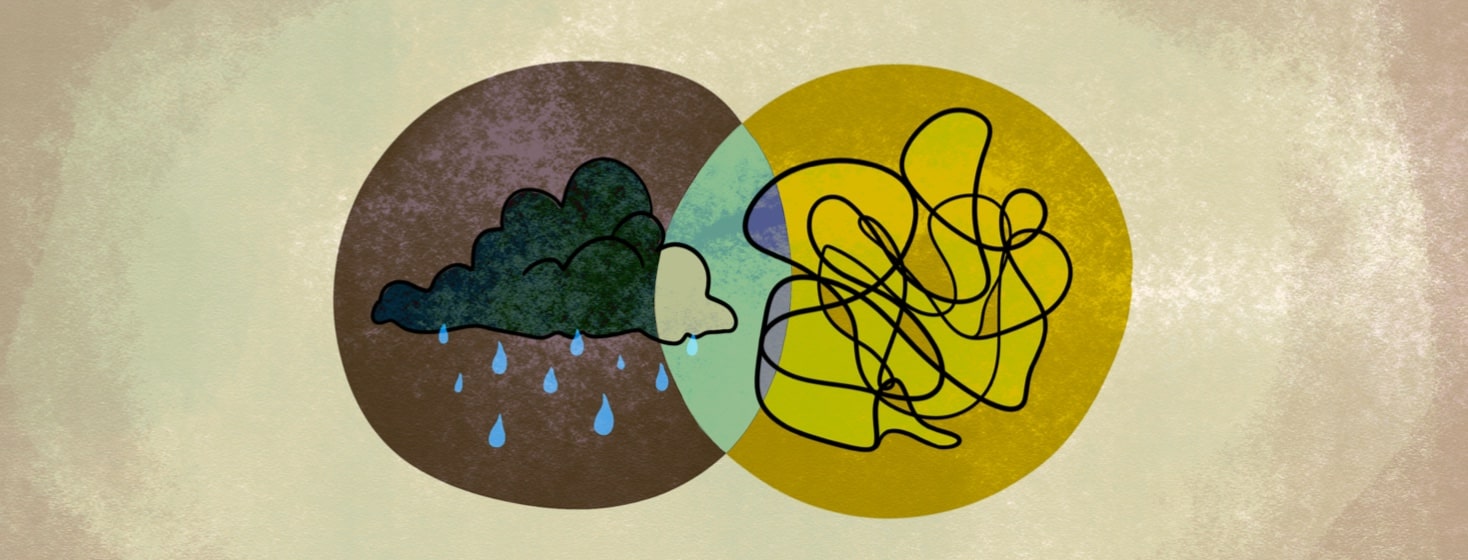Depression's Relationship With Anxiety
Depression and anxiety are the 2 most common mental health disorders. They have symptoms that overlap. For many people, depression and anxiety are comorbid. This means that they often happen at the same time. But one does not cause the other. And you can have one without the other.1
Depressions basics and different types
Depression is a mental health disorder. It affects how a person thinks, feels, and manages daily life. A person with depression has a down mood for more than 2 weeks. Depression can affect anyone. Women and LGBTQIA+ people are more likely to get a diagnosis. Men get depression, but are less likely to seek support.2
There are multiple types of depression:2,3
- Major depression – down mood lasting more than 2 weeks
- Seasonal affective disorder – low mood tied to the seasons, often starting in the fall and lasting until spring
- Persistent depressive disorder – low mood and loss of interest in activities for 2 years or more
- Perinatal depression – depression during or after pregnancy
Depression symptoms
Depression is a noticeable change in a person's mood. Everyone has more difficult days when life feels bleak. But people with depression have more of those days. When a person has symptoms of depression for 2 weeks, they can be diagnosed with depression.2-4
Depression looks different for each person. Possible symptoms include:2-4
- Feeling hopeless, grouchy, sad, or useless
- Lack of energy
- Changes in sleep pattern
- Loss of interest in activities or socializing
- Unexplained weight changes
- Avoiding the people you usually spend time with (isolating)
- Thoughts of suicide or suicide attempts
- Depression-related fatigue
What is anxiety?
Anxiety is also a mental health disorder. As with depression, anyone can experience moments of anxiety. Life comes with worries!
But an anxiety disorder goes beyond occasional feelings of worry. The fear takes over and impacts daily life. The most common anxiety disorders include:3,5
- Generalized anxiety disorder – continual feelings of anxiety that affect daily life
- Social anxiety disorder – feeling judged by others or fear of social interactions
- Panic disorder – an intense sense of fear or dread, often without a specific trigger
- Phobia disorders – fear of a specific thing, such as spiders, heights, or blood
Anxiety symptoms
Anxiety symptoms can look different depending on which anxiety disorder a person has. A particular situation may trigger symptoms. Symptoms can also arise out of nowhere. Some common anxiety symptoms a person may experience:3-5
- Feeling restless, wound-up, or grouchy
- Trouble focusing or controlling worry
- Difficulty sleeping
- Unexplained stomachache, headache, or other pain
- Heart racing or chest pain
- Sweating
- Stiff posture
This or That
Do you experience anxiety as well as depression?
What causes depression and anxiety?
There can be several factors that trigger depressive episodes and anxiety. For many people, there is a genetic component. A family history of mental illness increases a person's risk. Stressful or traumatic events can trigger depression or anxiety. Even expected and welcome life changes bring stress. Graduating, starting a job, or buying a house are possible triggers. Alcohol and drug use also increase risk factors.2,3,5
Symptom onset
Anxiety and depression often start around the teen years. Anxiety disorders start earlier in life. Anxiety first occurs in the pre-teen and early teenage years. Depression typically starts a bit later. The onset of depression is during the teenage years or early adulthood.1,2,4,5
People with depression and anxiety have a harder time managing symptoms. Depression with anxiety increases the likelihood of suicidal thoughts.1,2,4,5
Treating depression and anxiety
Depression and anxiety have overlapping treatment approaches. Doctors prescribe antidepressant drugs for both diseases. Doctors also prescribe therapy for anxiety and depression. Talking with a therapist offers new ways of thinking and engaging the world. Support groups bring people together to encourage each other.2,3,5
